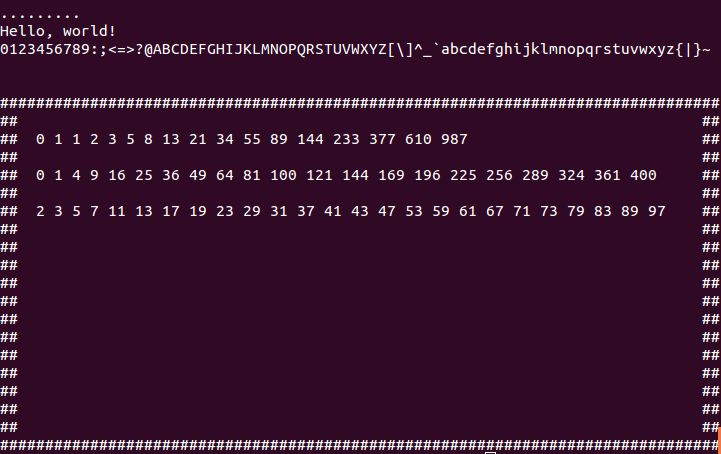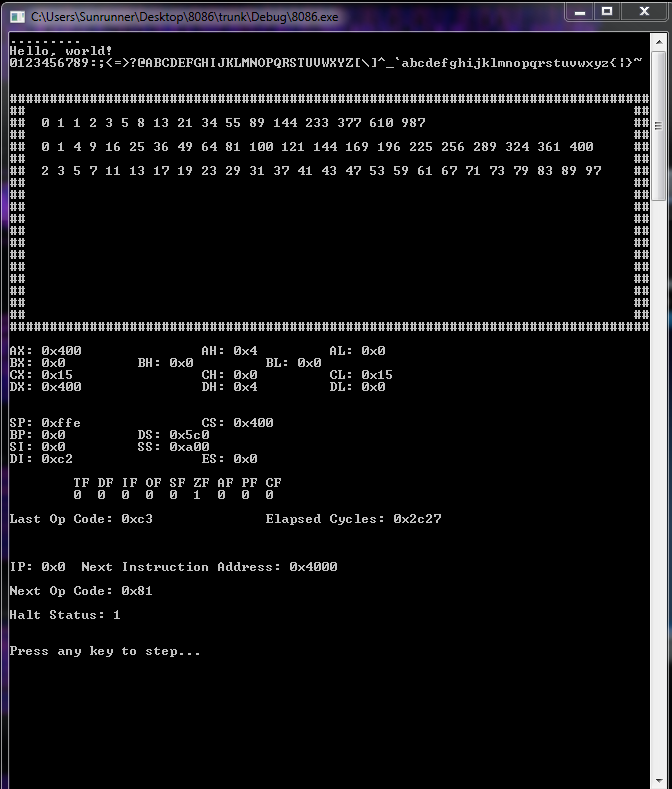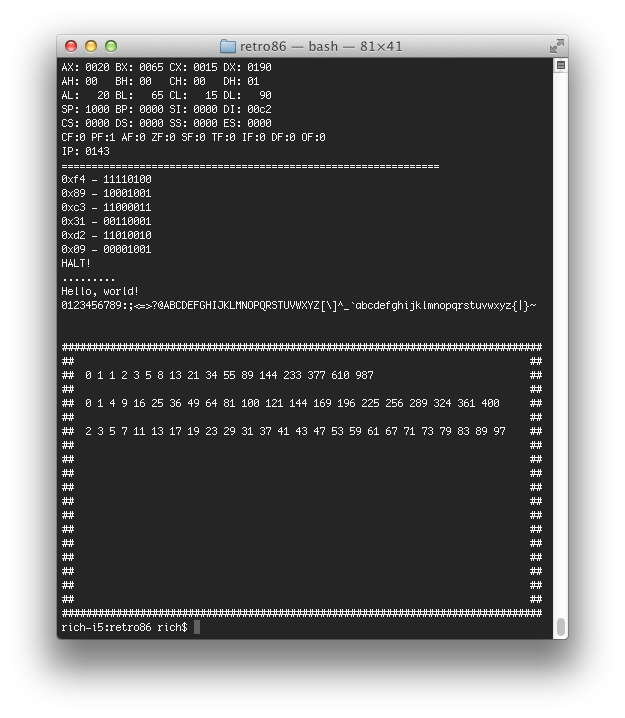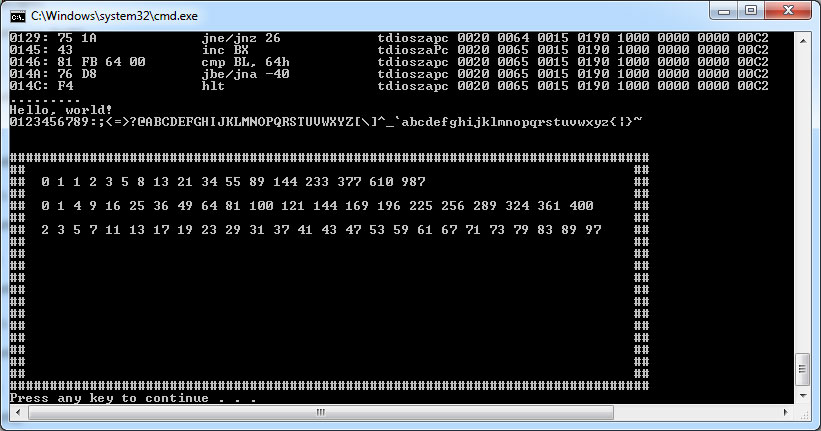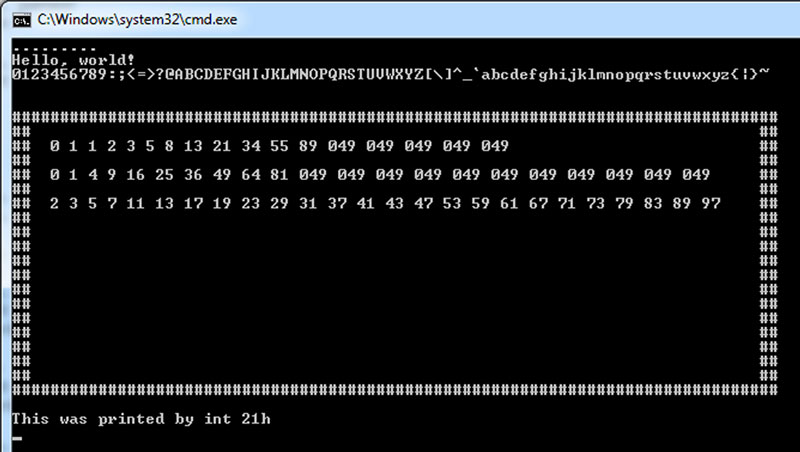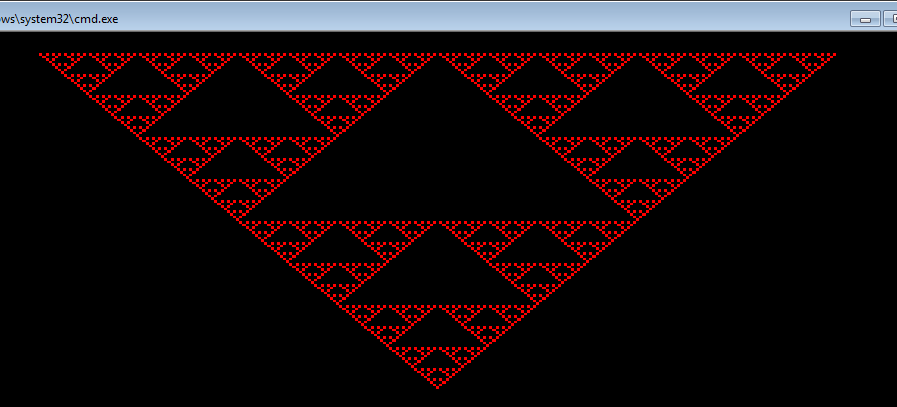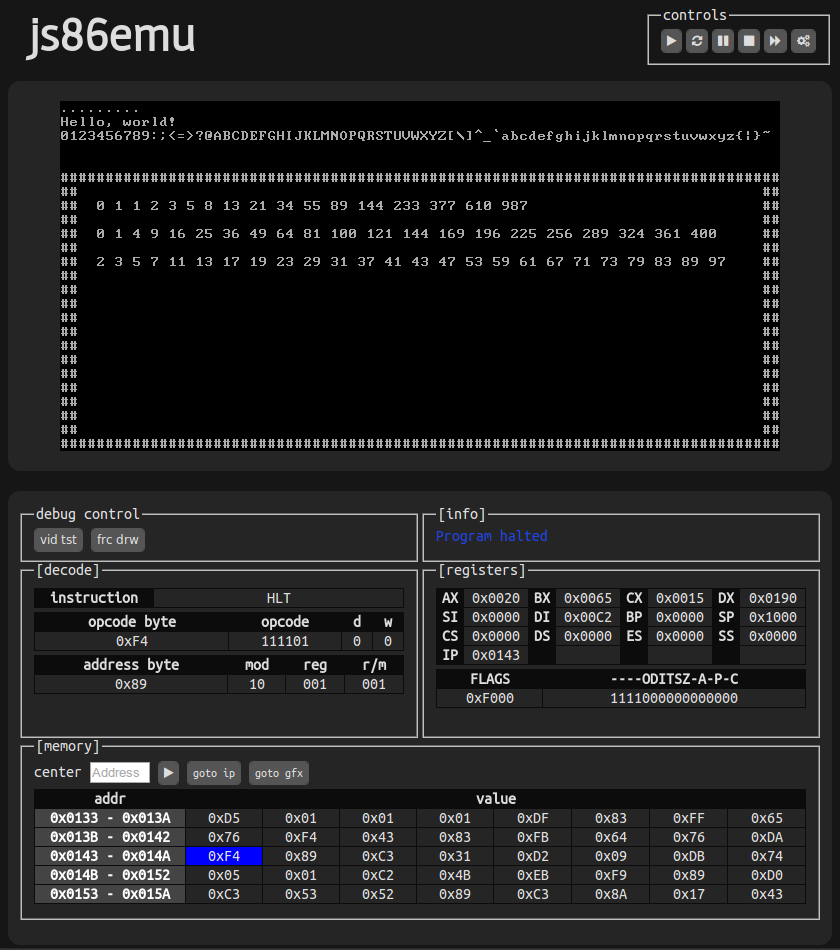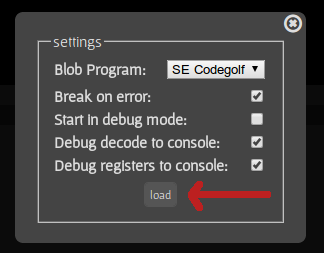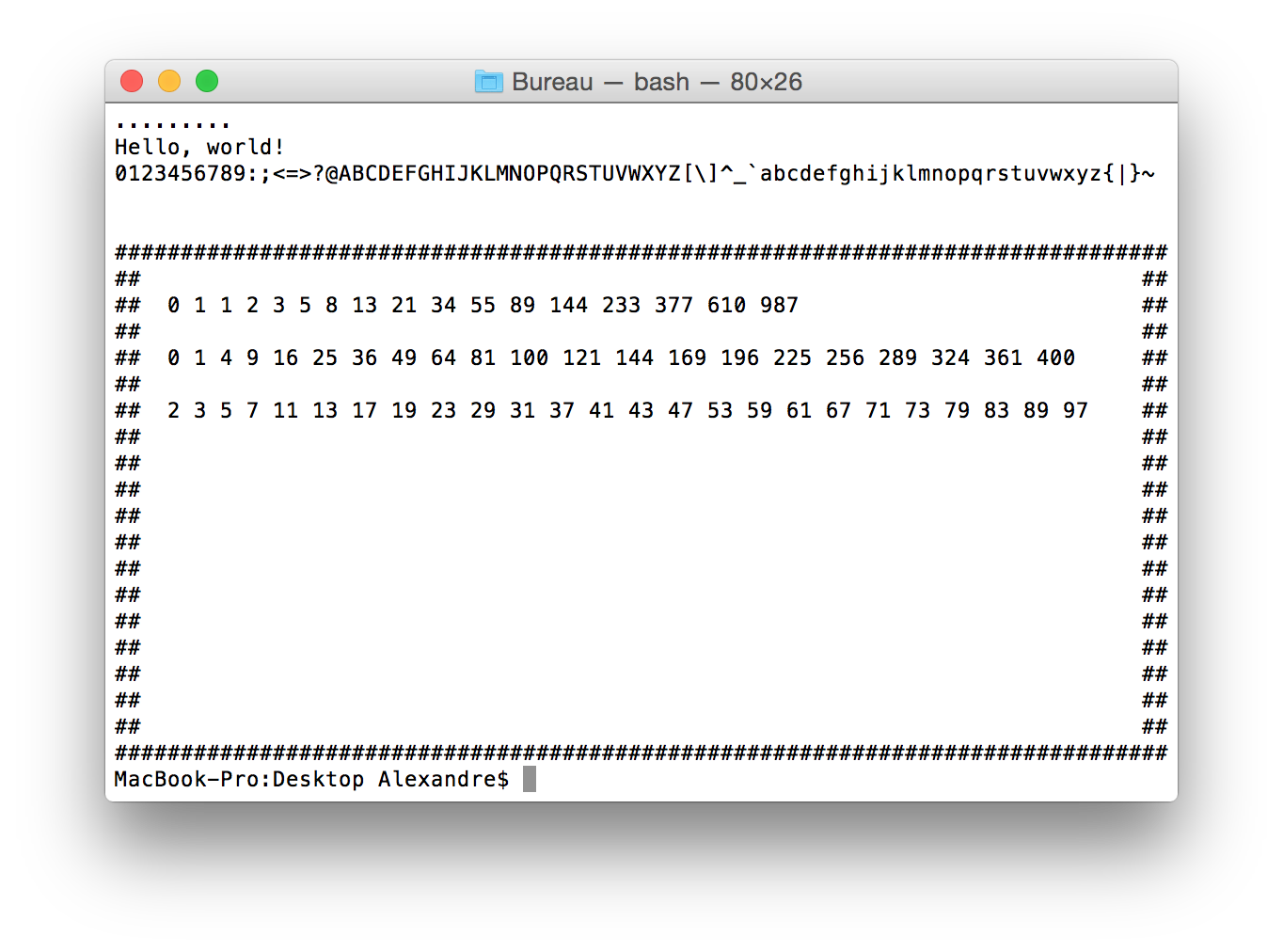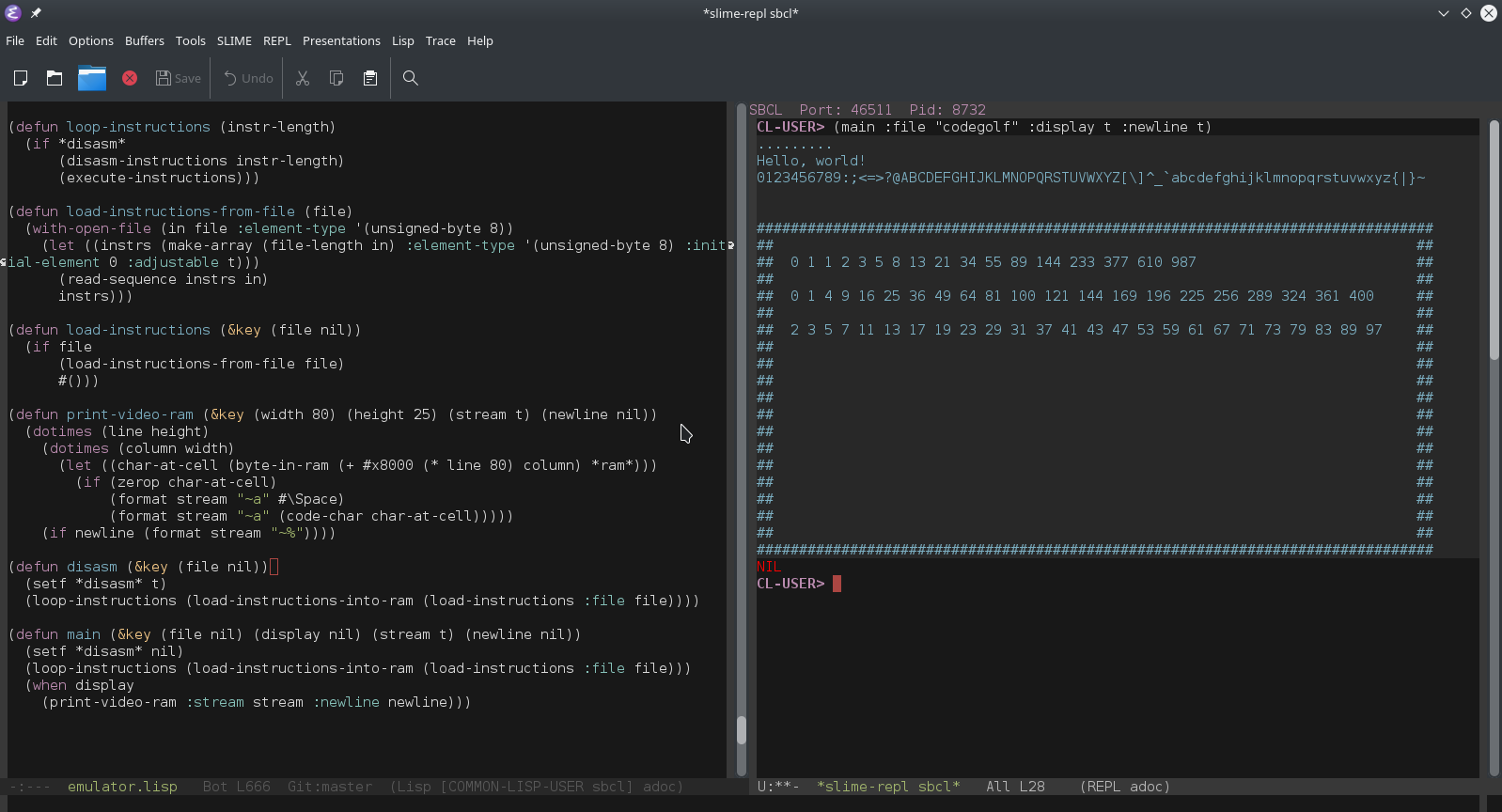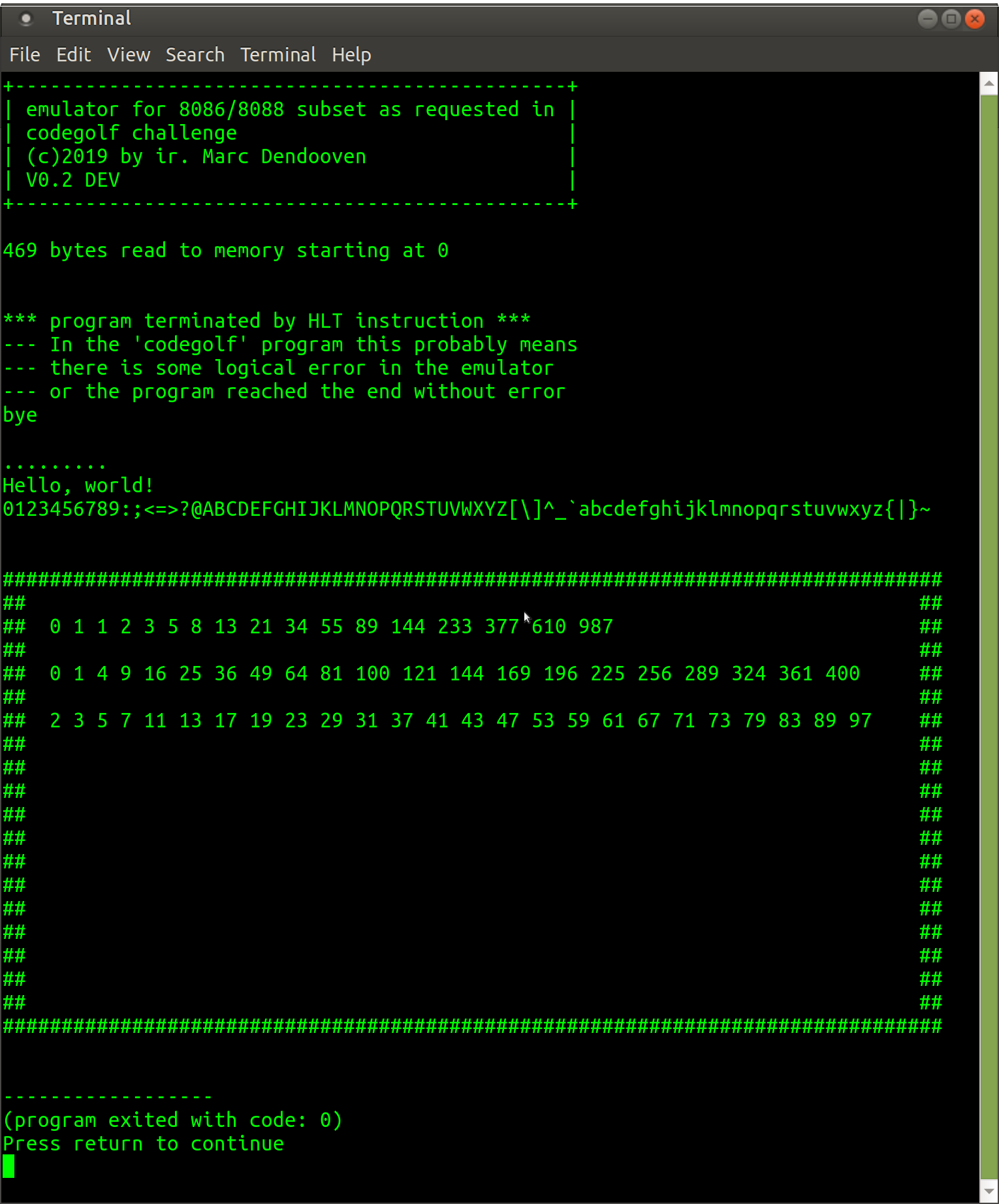MASM32, 1063+104+35=1202 lines
Actually done as a project for my assembly course at my college...
We modified the video memory layout slightly so it reflects that of a real 8086 machine from the good old days, i.e. video memory starting at 0xb8000, and contains an extra byte per character for foreground / background color.
Don't know if it's short enough to meet the needs of an answer, since I'm new to codegolf... But anyway, I find it somewhat gripping to code an emulator of 8086 with, ..., x86 assembly itself! Take a look at the results below.


Here goes the code. The code is also available at GitHub.
binloader.asm
; we assume that the memory is of 1MB size, and code should be loaded at 7c0:0 ; that is different from real 8086s which boot up from ffff:0 ; however 7c0:0 is more convenient for our test binary ; time permitted, we might switch to ffff:0 and code a small bios LoadBinaryIntoEmulator PROC USES ebx esi, mem:ptr byte, lpFileName:ptr byte LOCAL hFile:dword, numBytesRead:dword, fileSize:dword, mbrAddr:ptr dword MBR_SIZE equ 512 mov numBytesRead, 0 INVOKE CreateFileA, lpFileName, GENERIC_READ, FILE_SHARE_READ, 0, OPEN_EXISTING, FILE_ATTRIBUTE_NORMAL, 0 cmp eax, INVALID_HANDLE_VALUE je loadbin_error_ret mov hFile, eax INVOKE GetFileSize, hFile, 0 cmp eax, 512 jb loadbin_file_small mov eax, 512 loadbin_file_small: mov fileSize, eax mov ecx, mem add ecx, 7c00h mov mbrAddr, ecx INVOKE ReadFile, hFile, ecx, fileSize, ADDR numBytesRead, 0 ; read file to 7c00h test eax, eax jz loadbin_error_ret mov ecx, mbrAddr cmp dword ptr [ecx + 510], 0aa55h ; check for mbr flag jne loadbin_error_ret ; error if no flag detected mov eax, 0 ; success ret loadbin_error_ret: mov eax, 1 ret LoadBinaryIntoEmulator ENDP
term.asm
IFNDEF TERM_INC TERM_INC equ <1> InitEmuScreen PROC ; call this only once to initialize the emulator screen LOCAL hCon:dword, hWin:dword, termSize:COORD, rect:SMALL_RECT, cursorInfo:CONSOLE_CURSOR_INFO INVOKE GetStdHandle, STD_OUTPUT_HANDLE mov hCon, eax mov rect.Left, 0 mov rect.Top, 0 mov rect.Right, 80-1 mov rect.Bottom, 28 INVOKE SetConsoleWindowInfo, hCon, 1, ADDR rect ; set the size of display area mov termSize.x, 80 mov termSize.y, 29 ; 25 lines for output, 2 lines for status, 1 line empty INVOKE SetConsoleScreenBufferSize, hCon, dword ptr termSize ; set the size of buffer (1 extra line) INVOKE GetConsoleWindow mov hWin, eax INVOKE GetWindowLong, hWin, GWL_STYLE mov ecx, WS_MAXIMIZEBOX not ecx and eax, ecx mov ecx, WS_MINIMIZEBOX not ecx and eax, ecx mov ecx, WS_SIZEBOX not ecx and eax, ecx ; eax := eax & ~WS_MAXIMIZEBOX & ~WS_SIZEBOX & ~WS_MINIMIZEBOX INVOKE SetWindowLong, hWin, GWL_STYLE, eax mov [cursorInfo.dwSize], 1 mov [cursorInfo.bVisible], 0 INVOKE SetConsoleCursorInfo, hCon, ADDR cursorInfo ret InitEmuScreen ENDP WriteEmuScreen PROC USES ebx esi, mem:ptr byte ; update the emulator screen with memory starting from b800:0 LOCAL hCon:dword, termCoord:COORD, textAttr:dword count equ 80*25 mov esi, mem INVOKE GetStdHandle, STD_OUTPUT_HANDLE mov hCon, eax mov ecx, 0 _loop: cmp ecx, count jge _loop_end mov edx, ecx shr edx, 16 movzx eax, cx ; prepare ecx in dx:ax mov bx, 80 ; divide by 80 to get num of lines div bx mov [termCoord.y], ax mov [termCoord.x], dx push ecx INVOKE SetConsoleCursorPosition, hCon, dword ptr termCoord ; move cursor to termCoord movzx ecx, byte ptr [esi+1] mov textAttr, ecx INVOKE SetConsoleTextAttribute, hCon, textAttr ; set color attrs, etc. INVOKE WriteConsoleA, hCon, esi, 1, 0, 0 ; put one char pop ecx add esi, 2 inc ecx jmp _loop _loop_end: INVOKE SetConsoleCursorPosition, hCon, 0 INVOKE SetConsoleTextAttribute, hCon, 0 ; not visible mov eax, 0 ret WriteEmuScreen ENDP loadStatusColor MACRO colorType IFIDN <colorType>, <running> mov eax, BACKGROUND_GREEN or eax, BACKGROUND_INTENSITY EXITM ENDIF IFIDN <colorType>, <paused> mov eax, BACKGROUND_GREEN or eax, BACKGROUND_RED or eax, BACKGROUND_INTENSITY EXITM ENDIF echo Error: Unknown status ENDM WriteStatusLine PROC statusLine1:ptr byte, statusLine2:ptr byte, textAttr:dword ; suppose that both lines are 80 chars LOCAL hCon:dword, termCoord:COORD INVOKE GetStdHandle, STD_OUTPUT_HANDLE mov hCon, eax INVOKE SetConsoleTextAttribute, hCon, textAttr mov [termCoord.x], 0 mov [termCoord.y], 26 ; second last line INVOKE SetConsoleCursorPosition, hCon, dword ptr termCoord INVOKE WriteConsoleA, hCon, statusLine1, 80, 0, 0 add [termCoord.y], 1 INVOKE SetConsoleCursorPosition, hCon, dword ptr termCoord INVOKE WriteConsoleA, hCon, statusLine2, 80, 0, 0 INVOKE SetConsoleCursorPosition, hCon, 0 INVOKE SetConsoleTextAttribute, hCon, 0 ; not visible ret WriteStatusLine ENDP ENDIF
emulator.asm
.686 .model flat, stdcall option casemap:none include windows.inc include kernel32.inc include user32.inc include msvcrt.inc includelib user32.lib includelib kernel32.lib includelib msvcrt.lib printf PROTO C :ptr byte, :VARARG .data floppyPath byte "./floppy.img", 0 haltMsgTitle byte "Halted", 0 haltMsg byte "HLT is executed; since interrupt is not supported, the emulator will now exit.", 0 UDMsgTitle byte "Undefined Instruction", 0 UDMsg byte "Encountered an undefined instruction. (#UD)", 0 debugMsg byte "%d %d %d %d", 0AH, 0DH, 0 invalidOpMsg byte "Invalid Operation!", 0Dh, 0Ah, 0 statusRunning byte "Running", 0 statusPaused byte "Paused", ' ', 0 statusLineFmt1 byte "%s ", 9 dup(' '), "AX=%04X CX=%04X DX=%04X BX=%04X SP=%04X BP=%04X SI=%04X DI=%04X", 0 statusLineFmt2 byte "any key = step, c = continue", 4 dup(' '), "IP=%04X FLAGS=%02X ES=%04X CS=%04X SS=%04X DS=%04X", 0 lineBuf1 byte 128 dup(?) lineBuf2 byte 128 dup(?) running byte 0 REGB label byte REGW label word R_AL label byte R_AX word 0 R_CX word 0 R_DX word 0 R_BX word 0 R_SP word 0 R_BP word 0 R_SI word 0 R_DI word 0 REGS label word R_ES word 0 R_CS word 0 ; mbr R_SS word 0 R_DS word 0 R_FLAGS byte 0 R_IP word 7c00H MEMO_Guard byte 00FFH statusTextAttr dword 0 screenRefreshCounter word 0 .data? MEMO byte 1048576 DUP(?) .code ; mod[2] xxx r/m[3] passed by ah, start of instruction(host) passed by ebx ; when r/m is reg, need to pass word/byte in lowest bit of al ; not modify al, ah and ebx ; effective address(host) returned by edx, ; end of displacement field(host) returned by esi computeEffectiveAddress MACRO LeaveLabel, DisableFallThroughLeave, SegmentType ; MACRO local label LOCAL NoDisplacement, MOD123, MOD23, RM_Decode, RM_Is1XX, RM_Is11X, AddDisplacment, MOD3, RM_IsWordReg ; ah already = mod[2] reg[3] r/m[3] or mod[2] op[3] r/m[3] mov cl, ah shr cl, 6; mod jnz MOD123 ; mod = 00 mov cl, ah ; mod[2] reg[3] r/m[3] and cl, 0111b ; r/m[3] cmp cl, 0110b ; check special case jne NoDisplacement ; r/m = 110 special case, 16bit displacement only movzx edi, word ptr [ebx + 2] lea esi, [ebx + 4] ; end of displacement field(host) xor edx, edx ; clear edx for displacement only jmp AddDisplacment NoDisplacement: xor edi, edi ; common case, no displacement lea esi, [ebx + 2] ; end of displacement field(host) jmp RM_Decode MOD123: cmp cl, 1 jne MOD23 ; mod = 01 movzx edi, byte ptr [ebx + 2] ; 8bit displacement lea esi, [ebx + 3] ; end of displacement field(host) jmp RM_Decode MOD23: cmp cl, 2 jne MOD3 ; mod = 10 movzx edi, word ptr [ebx + 2] ; 16bit displacement lea esi, [ebx + 4] ; end of displacement field(host) ; fall-through RM_Decode: ; displacement in edi movzx ecx, ah ; mod[2] reg[3] r/m[3] test ecx, 0100b jnz RM_Is1XX ; r/m = 0,b,i and ecx, 0010b ; Base = b ? BP : BX, R_BP = R_BX + 4 movzx edx, word ptr R_BX[ecx * 2] ; actually word ptr is not needed movzx ecx, ah ; mod[2] reg[3] r/m[3] and ecx, 0001b ; Index = i ? DI : SI, R_DI = R_SI + 4 movzx ecx, word ptr R_SI[ecx * 2] add edx, ecx jmp AddDisplacment RM_Is1XX: test ecx, 0010b jnz RM_Is11X ; r/m = 1,0,i and ecx, 0001b ; Index = i ? DI : SI, R_DI = R_SI + 4 movzx edx, word ptr R_SI[ecx * 2] jmp AddDisplacment RM_Is11X: ; r/m = 1,1,~b and ecx, 0001b ; Base = b ? BP : BX, R_BP = R_BX + 4 xor ecx, 1 movzx edx, word ptr R_BX[ecx * 4] ; fall-through AddDisplacment: add edx, edi ; effective address(virtual) now in edx ; now edi free movzx ecx, SegmentType shl ecx, 4 lea edx, MEMO[edx + ecx] ; effective address(host) jmp LeaveLabel MOD3: ; r/m = register lea esi, [ebx + 2] ; end of displacement(host) (No Displacement) movzx ecx, ah ; mod[2] reg[3] r/m[3], moved before jump to reuse code test al, 0001b ; first byte still in al, decide 16bit or 8bit register jnz RM_IsWordReg ; 8bit register and ecx, 0011b lea edx, REGB[ecx * 2] ; ACDB movzx ecx, ah and ecx, 0100b ; 0 -> L, 1 -> H shr ecx, 2 add edx, ecx ; register host address now in edx jmp LeaveLabel RM_IsWordReg: ; 16bit register and ecx, 0111b lea edx, REGW[ecx * 2] ; register host address now in edx ; fall-through IF DisableFallThroughLeave jmp LeaveLabel ENDIF ENDM ; ebx is flat addr in host machine computeFlatIP MACRO movzx eax, R_CS shl eax, 4 movzx ebx, R_IP lea ebx, MEMO[ebx + eax] ENDM ; use ah modifyFlagsInstruction MACRO instruction mov ah, R_FLAGS sahf instruction lahf mov R_FLAGS, ah ENDM ; error case return address passed by ecx ; success will use ret ; flat ip in ebx ArithLogic PROC movzx eax, word ptr [ebx]; read 2 bytes at once for later use, may exceed 1M, but we are in a emulator test eax, 11000100b ; only test low byte -- the first byte jz RegWithRegOrMem; must be 00xxx0xx, No Imm Op test eax, 01111100b jz ImmWithRegOrMem; must be 100000xx(with test 11000100b not zero), Imm to reg/mem test eax, 11000010b jz ImmToAcc; must be 00xxx10x(with test 11000100b not zero), Imm to accumulator Op jmp ecx; Other Instructions ImmToAcc: xor ecx, ecx test al, 0001b setnz cl lea edx, [R_AX] ; dest addr lea esi, [ebx + 1] ; src addr lea edi, [ecx + 2] ; delta ip ; now ebx free movzx ebx, al ; first byte contains op[3] jmp Operand ImmWithRegOrMem: RegWithRegOrMem: computeEffectiveAddress SrcIsRegOrImm, 0, R_DS SrcIsRegOrImm: ; not real src, d[1] decide real src mov edi, esi ; copy "end of displacement(host)" for delta ip sub edi, ebx ; compute delta ip, not yet count imm data, will be handled in SrcIsImm ; now ebx free test al, 10000000b ; first byte still in al jnz SrcIsImm ; Not Imm, Use Reg movzx ebx, al ; first byte contains op[3] shr ah, 2 ; not fully shift to eliminate index scaling movzx ecx, ah ; 00 mod[2] reg[3] x, moved before jump to reuse code test al, 0001b ; decide 16bit or 8bit register jnz REG_IsWordReg ; 8bit register and ecx, 0110b ; ecx = 00 mod[2] reg[3] x ; 0,2,4,6 -> ACDB movzx ebx, ah and ebx, 1000b ; 0 -> L, 1 -> H shr ebx, 3 lea esi, REGB[ecx + ebx] ; reg register host address now in esi jmp SRC_DEST ; first byte still in al REG_IsWordReg: ; 16bit register and ecx, 1110b lea esi, REGW[ecx] ; reg register host address now in esi jmp SRC_DEST ; first byte still in al SrcIsImm: movzx ebx, ah ; second byte contains op[3] ; compute delta ip xor ecx, ecx cmp al, 10000001b ; 100000 s[1] w[1], 00: +1, 01: +2, 10: +1, 11: +1 sete cl lea edi, [edi + 1 + ecx] ; delta ip in edi ; imm data host address(end of displacement) already in esi jmp SRC_DEST ; first byte still in al SRC_DEST: ; first byte still in al test al, 10000000b; jnz Operand ; Imm to r/m, no need to exchange test al, 0010b; d[1] or s[1] (Imm to r/m case) jz Operand ; d = 0 no need to exchange xchg esi, edx ; put src in esi and dest in edx, for sub/sbb/cmp and write back ; fall-through Operand: ; first byte still in al test al, 0001b ; decide 8bit or 16bit operand jnz OperandW ; word operand ; use 8bit partial reg for convenience ; generally that will be slower because of partial register stalls ; fortunately we don't need to read from cx or ecx, actually no stall occur mov cl, byte ptr [esi] ; src operand and ebx, 00111000b ; xx op[3] xxx, select bits, clear others ; Not shift, eliminate index * 8 for OpTable jmp dword ptr [OpTable + ebx] OperandW: ; first byte still in al test al, 10000000b jz NotSignExt ; Not Imm to r/m test al, 0010b; s[1] jz NotSignExt movsx cx, byte ptr [esi] ; src operand, sign ext jmp OperandWExec NotSignExt: mov cx, word ptr [esi] ; src operand ; fall-through OperandWExec: and ebx, 00111000b ; xx op[3] xxx, select bits, clear others ; Not shift, eliminate index * 8 for OpTable jmp dword ptr [OpTable + 4 + ebx] OpTable: ; could store diff to some near Anchor(e.g. OpTable) to save space ; but we use a straightforward method dword B_ADD, W_ADD dword B_OR, W_OR dword B_ADC, W_ADC dword B_SBB, W_SBB dword B_AND, W_AND dword B_SUB, W_SUB dword B_XOR, W_XOR dword B_CMP, W_CMP ByteOp: B_CMP: cmp byte ptr [edx], cl jmp WriteFlags B_XOR: xor byte ptr [edx], cl jmp WriteFlags B_SUB: sub byte ptr [edx], cl jmp WriteFlags B_AND: and byte ptr [edx], cl jmp WriteFlags B_SBB: mov ah, R_FLAGS sahf sbb byte ptr [edx], cl jmp WriteFlags B_ADC: mov ah, R_FLAGS sahf adc byte ptr [edx], cl jmp WriteFlags B_OR: or byte ptr [edx], cl jmp WriteFlags B_ADD: add byte ptr [edx], cl jmp WriteFlags WordOp: W_CMP: cmp word ptr [edx], cx jmp WriteFlags W_XOR: xor word ptr [edx], cx jmp WriteFlags W_SUB: sub word ptr [edx], cx jmp WriteFlags W_AND: and word ptr [edx], cx jmp WriteFlags W_SBB: mov ah, R_FLAGS sahf sbb word ptr [edx], cx jmp WriteFlags W_ADC: mov ah, R_FLAGS sahf adc word ptr [edx], cx jmp WriteFlags W_OR: or word ptr [edx], cx jmp WriteFlags W_ADD: add word ptr [edx], cx ; fall-through WriteFlags: lahf ; load flags into ah mov R_FLAGS, ah add R_IP, di ret ArithLogic ENDP Arith_INC_DEC PROC ; note: inc and dec is partial flags writer we need to load flags before inc or dec movzx eax, word ptr [ebx] ; read 2 byte at once, may exceed 1M, but we are in a emulator xor al, 01000000b test al, 11110000b ; high 4 0100 jz RegOnly xor al, 10111110b ; equiv to xor 11111110 at once test al, 11111110b jz RegOrMem jmp ecx RegOnly: add R_IP, 1 ; 1byte long movzx ebx, al test al, 00001000b jnz RegOnlyDEC ; other bits in eax already clear ; INC ; note: load flags use ah modifyFlagsInstruction <inc word ptr REGW[ebx * 2]> ret RegOnlyDEC: modifyFlagsInstruction <dec word ptr REGW[ebx * 2 - 16]> ; 1 reg[3], *2 - 16 ret RegOrMem: test ah, 00110000b jz Match jmp ecx ; other instructions Match: ; note: al lowest bit already w[1] computeEffectiveAddress INC_DEC_ComputeEA_Done, 0, R_DS INC_DEC_ComputeEA_Done: sub esi, ebx add R_IP, si test ah, 00001000b jnz RegOrMemDEC ; INC test al, 0001b jnz WordINC ; byte INC modifyFlagsInstruction <inc byte ptr [edx]> ret WordINC: modifyFlagsInstruction <inc word ptr [edx]> ret RegOrMemDEC: test al, 0001b jnz WordDEC ; byte DEC modifyFlagsInstruction <dec byte ptr [edx]> ret WordDEC: modifyFlagsInstruction <dec word ptr [edx]> ret Arith_INC_DEC ENDP ; uses ah GenerateJmpConditional MACRO jmp_cc movsx di, ah mov ah, R_FLAGS sahf jmp_cc Jmp_Short_Rel8_Inner add R_IP, 2 ; instruction length = 2 bytes ret ENDM ; flat ip in ebx ; NOTE: cs can be changed! ; error case return address passed by ecx ; success will use ret ControlTransfer PROC movzx eax, word ptr [ebx] ; read 2 byte at once, may exceed 1M, but we are in a emulator cmp al, 0E8h ; parse instruction type je Call_Direct_Near cmp al, 09Ah je Call_Direct_Far cmp al, 0FFh je Call_Jmp_Indirect cmp al, 0EBh je Jmp_Short_Rel8 cmp al, 0E9h je Jmp_Near_Rel16 cmp al, 0EAh je Jmp_Direct_Far FOR x, <70h,71h,72h,73h,74h,75h,76h,77h,78h,79h,7ah,7bh,7ch,7dh,7eh,7fh> ; conditional jmp cmp al, x je Jmp&x ENDM movzx edi, word ptr [ebx + 1] ; pop imm16 bytes cmp al, 0C2h je Ret_Near cmp al, 0CAh ; edi already load je Ret_Far xor edi, edi ; pop 0 byte cmp al, 0C3h je Ret_Near cmp al, 0CBh ; edi already clear je Ret_Far jmp ecx ; other instructions Jmp70h: GenerateJmpConditional jo Jmp71h: GenerateJmpConditional jno Jmp72h: GenerateJmpConditional jb Jmp73h: GenerateJmpConditional jae Jmp74h: GenerateJmpConditional je Jmp75h: GenerateJmpConditional jne Jmp76h: GenerateJmpConditional jbe Jmp77h: GenerateJmpConditional ja Jmp78h: GenerateJmpConditional js Jmp79h: GenerateJmpConditional jns Jmp7ah: GenerateJmpConditional jpe Jmp7bh: GenerateJmpConditional jpo Jmp7ch: GenerateJmpConditional jl Jmp7dh: GenerateJmpConditional jge Jmp7eh: GenerateJmpConditional jle Jmp7fh: GenerateJmpConditional jg Jmp_Short_Rel8: movsx di, ah Jmp_Short_Rel8_Inner: add di, 2 ; instruction length = 2 bytes add R_IP, di ; ip += rel8 sign extended to 16bit (relative to next instruction) ret Call_Direct_Near: ; near direct is ip relative, cannot reuse indirect code movzx edx, R_SP movzx ecx, R_SS sub R_SP, 2 ; write after read to avoid stall shl ecx, 4 mov si, R_IP add si, 3 ; instruction length = 3 bytes mov word ptr MEMO[edx + ecx - 2], si add si, word ptr [ebx + 1] mov R_IP, si ; write back ret ; not reuse code Jmp_Near_Rel16: ; ip += displacement mov si, R_IP add si, 3 ; instruction length = 3 bytes add si, word ptr [ebx + 1] mov R_IP, si ; write back ret Call_Direct_Far: lea edx, [ebx + 1] lea esi, [ebx + 5] jmp Call_Indirect_Far ; reuse code Jmp_Direct_Far: lea edx, [ebx + 1] lea esi, [ebx + 5] jmp Jmp_Indirect_Far ; reuse code Call_Jmp_Indirect: test ah, 00110000b jz NotMatch ; xx00xxxx xor ah, 00110000b test ah, 00110000b jz NotMatch ; xx11xxxx computeEffectiveAddress Control_Flow_EA_Done, 0, R_DS ; fall-through Control_Flow_EA_Done: ; IMPORTANT: ah xor with 00110000b test ah, 00100000b jz Jmp_Indirect ; xx10sxxx ; xx01sxxx test ah, 00001000b jz Call_Indirect_Near ; xx010xxx jmp Call_Indirect_Far ; xx011xxx Jmp_Indirect: ; xx10sxxx test ah, 00001000b jz Jmp_Indirect_Near ; xx100xxx jmp Jmp_Indirect_Far ; xx101xxx NotMatch: jmp ecx Call_Indirect_Near: sub esi, ebx ; esi-ebx is command length add si, R_IP ; add to R_IP to get offset of next instruction ; now ebx free ; push ip movzx ebx, R_SP movzx ecx, R_SS sub R_SP, 2 ; write after read to avoid stall shl ecx, 4 mov word ptr MEMO[ebx + ecx - 2], si ; fall-through Jmp_Indirect_Near: mov ax, word ptr [edx] ; load offset into cx mov R_IP, ax ; write back new ip ret Call_Indirect_Far: sub esi, ebx ; esi-ebx is command length add si, R_IP ; add to R_IP to get offset of next instruction ; now ebx free ; push cs, then push ip movzx ebx, R_SP movzx ecx, R_SS sub R_SP, 4 ; write after read to avoid stall shl ecx, 4 movzx eax, R_CS shl eax, 16 or eax, esi ; avoid partial register write then read whole register mov dword ptr MEMO[ebx + ecx - 4], eax ; fall-through Jmp_Indirect_Far: mov eax, dword ptr [edx] mov R_IP, ax shr eax, 16 mov R_CS, ax ret Ret_Near: movzx edx, R_SP movzx ecx, R_SS shl ecx, 4 mov ax, word ptr MEMO[edx + ecx] ; rtn addr in ax mov R_IP, ax add di, 2 ; pop n + 2 byte add R_SP, di ret Ret_Far: movzx edx, R_SP movzx ecx, R_SS shl ecx, 4 mov eax, dword ptr MEMO[edx + ecx]; rtn addr (high[16] = cs, low[16] = ip ) in eax mov R_IP, ax shr eax, 16 mov R_CS, ax mov R_IP, ax add di, 4 ; pop n + 4 byte add R_SP, di ret ControlTransfer ENDP ; error case return address passed by ecx ; flat ip in ebx ; success will use ret DataTransferMOV PROC movzx eax, word ptr [ebx] ; read 2 byte at once, may exceed 1M, but we are in a emulator xor al, 10001000b test al, 11111100b ; high 6 100010 jz RegWithRegOrMem ; 100010xx ; not xor test al, 11111001b jz SegRegWithRegOrMem; 100011x0, previous test with 11111100b not zero, thus test with 0100b must not zero xor al, 00101000b ; equiv to xor 10100000b at once test al, 11111100b ; high 6 101000 jz MemWithAccumulator xor al, 00010000b ; equiv to xor 10110000b at once test al, 11110000b ; high 4 1011 jz ImmToReg xor al, 01110110b ; equiv to xor 11000110b at once test al, 11111110b ; high 7 1100011 jz ImmToRegOrMem jmp ecx ImmToRegOrMem: or al, 10000000b ; set flag to reuse code, repeat macro maybe a little faster jmp WithRegOrMem SegRegWithRegOrMem: or al, 0001b ; SegReg case don't have w[1], manually set lowest bit ; fall-through RegWithRegOrMem: ; fall-through WithRegOrMem: computeEffectiveAddress SrcIsRegOrImm, 0, R_DS SrcIsRegOrImm: ; not real src, d[1] decide real src test al, 10000000b ; test flag jnz SrcIsImm ; Not Imm, Use Reg ; compute delta ip sub esi, ebx add R_IP, si ; now ebx, esi free shr ah, 2 ; not fully shift to eliminate index scaling movzx ecx, ah ; 00 mod[2] reg[3] x, moved before jump to reuse code test al, 0100b ; check if segment register jnz SegReg test al, 0001b ; decide 16bit or 8bit register jnz REG_IsWordReg ; 8bit register and ecx, 0110b ; ecx = 00 mod[2] reg[3] x ; 0,2,4,6 -> ACDB movzx ebx, ah and ebx, 1000b ; 0 -> L, 1 -> H shr ebx, 3 test al, 0010b ; d[1] jnz ToByteReg ; from byteReg mov al, byte ptr REGB[ecx + ebx] mov byte ptr [edx], al ret ToByteReg: mov al, byte ptr [edx] mov byte ptr REGB[ecx + ebx], al ret REG_IsWordReg: ; 16bit register and ecx, 1110b test al, 0010b ; d[1] jnz ToWordReg ; from WordReg mov ax, word ptr REGW[ecx] mov word ptr [edx], ax ret ToWordReg: mov ax, word ptr [edx] mov word ptr REGW[ecx], ax ret SrcIsImm: mov cx, word ptr [esi] ; read 2 byte at once to reuse code, may exceed 1M, but we are in a emulator test al, 0001b ; w[1] jnz WordSrcImm ; Byte Imm add esi, 1 sub esi, ebx add R_IP, si mov byte ptr [edx], cl ret WordSrcImm: add esi, 2 sub esi, ebx add R_IP, si mov word ptr [edx], cx ret SegReg: and ecx, 0110b ; reg[3] = 0 seg[2] test al, 0010b ; d[1] jnz ToSegReg mov ax, word ptr REGS[ecx] mov word ptr [edx], ax ret ToSegReg: mov ax, word ptr [edx] mov word ptr REGS[ecx], ax ret ImmToReg: test al, 1000b ; w[1] jnz WordImmToReg ; byte Imm ; ebx + 1 already in ah, ebx free add R_IP, 2 movzx ecx, al ; 0000 w[1] reg[3] and ecx, 0011b movzx ebx, al and ebx, 0100b shr ebx, 2 mov byte ptr REGB[ecx * 2 + ebx], ah ret WordImmToReg: add R_IP, 3 movzx ecx, al and ecx, 0111b mov ax, word ptr [ebx + 1] mov word ptr REGW[ecx * 2], ax ret MemWithAccumulator: add R_IP, 3 movzx edx, word ptr [ebx + 1] movzx ecx, R_DS shl ecx, 4 test al, 0010b ; 0 to accumulator jnz FromAccumulator mov bx, word ptr MEMO[edx + ecx] ; read 2 byte at once to reuse code, may exceed 1M, but we are in a emulator test al, 0001b ; w[1] jnz ToAX ; to AL mov R_AL, bl ret ToAX: mov R_AX, bx ret FromAccumulator: test al, 0001b ; w[1] jnz FromAX ; from AL mov bl, R_AL mov byte ptr MEMO[edx + ecx], bl ret FromAX: mov bx, R_AX mov word ptr MEMO[edx + ecx], bx ret DataTransferMOV ENDP ; error case return address passed by ecx ; flat ip in ebx ; success will use ret DataTransferStack PROC movzx eax, word ptr [ebx] ; read 2 byte at once, may exceed 1M, but we are in a emulator xor al, 01010000b test al, 11110000b ; high 4 0101 jz Register ; 0101xxxx xor al, 01010110b ; equiv to xor 00000110b at once test al, 11100110b ; 000xx11x jz SegmentRegister xor al, 10001001b ; equiv to xor 10001111b at once jz PopRegOrMem xor al, 01110000b ; equiv to xor 11111111b at once jz PushRegOrMem jmp ecx Register: add R_IP, 1 movzx esi, R_SP movzx ebx, R_SS shl ebx, 4 movzx ecx, al and ecx, 0111b test al, 1000b jnz PopRegister ; push mov ax, word ptr REGW[ecx * 2] sub R_SP, 2 ; push word mov word ptr MEMO[ebx + esi - 2], ax ret PopRegister: ; pop mov ax, word ptr MEMO[ebx + esi] add R_SP, 2 ; pop word mov word ptr REGW[ecx * 2], ax ret SegmentRegister: add R_IP, 1 movzx esi, R_SP movzx ebx, R_SS shl ebx, 4 movzx ecx, al and ecx, 00011000b shr ecx, 2 ; not fully shift test al, 0001b jnz PopSegmentRegister ; push mov ax, word ptr REGS[ecx] sub R_SP, 2 mov word ptr MEMO[ebx + esi - 2], ax ret PopSegmentRegister: ; pop mov ax, word ptr MEMO[ebx + esi] add R_SP, 2 mov word ptr REGS[ecx], ax ret PopRegOrMem: test ah, 00111000b jnz NotMatch or al, 10000000b ; set flag for code reuse jmp EA_Compute PopRegOrMemEADone: mov ax, word ptr MEMO[ebx + esi] add R_SP, 2 mov word ptr [edx], ax ret PushRegOrMem: xor ah, 00110000b test ah, 00111000b jnz NotMatch jmp EA_Compute PushRegOrMemEADone: mov ax, word ptr [edx] sub R_SP, 2 mov word ptr MEMO[ebx + esi - 2], ax ret EA_Compute: or al, 0001b ; set lowest bit indicate word register in r/m, which is xor cleared on instruction type check computeEffectiveAddress EA_Done, 0, R_DS EA_Done: sub esi, ebx add R_IP, si movzx esi, R_SP movzx ebx, R_SS shl ebx, 4 test al, 10000000b jz PushRegOrMemEADone jmp PopRegOrMemEADone NotMatch: jmp ecx DataTransferStack ENDP FlagInstruction PROC mov al, byte ptr [ebx] cmp al, 0F8h je ProcessClc cmp al, 0F9h je ProcessStc jmp ecx ProcessClc: add R_IP, 1 modifyFlagsInstruction <clc> ret ProcessStc: add R_IP, 1 modifyFlagsInstruction <stc> ret FlagInstruction ENDP XchgInstruction PROC movzx eax, word ptr [ebx] ; read 2 byte at once, may exceed 1M, but we are in a emulator xor al, 10000110b test al, 11111110b jz XchgRegOrMem xor al, 00010110b ; equiv to xor 10010000b test al, 11111000b jz XchgAX jmp ecx XchgAX: ; other bits in al already clear, only need to clear ah, but we just clear all add R_IP, 1 mov bx, R_AX and eax, 0111b xchg bx, word ptr REGW[eax * 2] mov R_AX, bx ret XchgRegOrMem: computeEffectiveAddress XchgRegOrMemEADone, 0, R_DS XchgRegOrMemEADone: sub esi, ebx add R_IP, si ; now ebx, esi free shr ah, 2 ; not fully shift to eliminate index scaling movzx ecx, ah ; 00 mod[2] reg[3] x, moved before jump to reuse code test al, 0001b ; decide 16bit or 8bit register jnz XchgRegOrMemWord ; 8bit register and ecx, 0110b ; ecx = 00 mod[2] reg[3] x ; 0,2,4,6 -> ACDB movzx ebx, ah and ebx, 1000b ; 0 -> L, 1 -> H shr ebx, 3 mov al, byte ptr [edx] xchg al, byte ptr REGB[ecx + ebx] mov byte ptr [edx], al ret XchgRegOrMemWord: and ecx, 1110b mov ax, word ptr [edx] xchg ax, word ptr REGW[ecx] mov word ptr [edx], ax XchgInstruction ENDP computeEffectiveAddressUnitTest MACRO LOCAL callback, L1, L2, L3, L4, L5, L6 mov ebx, offset MEMO mov byte ptr [ebx + 2], 0 mov byte ptr [ebx + 3], 1 mov ah, 00000110b push offset L1 computeEffectiveAddress callback, 1, R_DS L1: mov ebx, offset MEMO mov byte ptr [ebx + 2], 10 mov byte ptr [ebx + 3], 0 mov ah, 00000110b push offset L2 computeEffectiveAddress callback, 1, R_DS L2: mov ebx, offset MEMO mov ah, 00000000b mov R_BX, 4 mov R_SI, 3 push offset L3 computeEffectiveAddress callback, 1, R_DS L3: mov ebx, offset MEMO mov ah, 10000000b mov byte ptr [ebx + 2], 10 mov byte ptr [ebx + 3], 0 mov R_BX, 4 mov R_SI, 3 push offset L4 computeEffectiveAddress callback, 1, R_DS L4: mov ebx, offset MEMO mov ah, 00000101b mov R_DI, 5 push offset L5 computeEffectiveAddress callback, 1, R_DS L5: mov ebx, offset MEMO mov ah, 00000111b mov R_BX, 9 push offset L6 computeEffectiveAddress callback, 1, R_DS L6: ret callback: INVOKE printf, offset debugMsg, offset MEMO, edx, esi, 0 ret ENDM include term.asm include binloader.asm main PROC INVOKE LoadBinaryIntoEmulator, ADDR MEMO, ADDR floppyPath INVOKE InitEmuScreen ; initialize terminal lea edi, [MEMO + 0b8000h] mov ecx, 80*25 mov ax, 0 rep lodsw ; clrscr ExecLoop: ; draw video memory movzx eax, running mov esi, OFFSET statusRunning test eax, eax mov ebx, OFFSET statusPaused cmovz esi, ebx FOR x, <R_DI, R_SI, R_BP, R_SP, R_BX, R_DX, R_CX, R_AX> movzx eax, x push eax ENDM push esi push offset statusLineFmt1 push offset lineBuf1 call crt_sprintf add esp, 44 FOR x, <R_DS, R_SS, R_CS, R_ES, R_FLAGS, R_IP> movzx eax, x push eax ENDM push offset statusLineFmt2 push offset lineBuf2 call crt_sprintf add esp, 32 movzx eax, running test eax, eax jnz Exec_TextAttr_Running loadStatusColor paused jmp Exec_TextAttr_End Exec_TextAttr_Running: loadStatusColor running Exec_TextAttr_End: mov statusTextAttr, eax movzx eax, running test eax, eax jnz ExecRunning INVOKE WriteEmuScreen, ADDR [MEMO + 0b8000h] INVOKE WriteStatusLine, ADDR lineBuf1, ADDR lineBuf2, statusTextAttr ; check keyboard input INVOKE crt__getch cmp eax, 'c' ; 'c' is pressed jne RefreshedScreen mov running, 1 jmp RefreshedScreen ExecRunning: add screenRefreshCounter, 1 jno RefreshedScreen INVOKE WriteStatusLine, ADDR lineBuf1, ADDR lineBuf2, statusTextAttr INVOKE WriteEmuScreen, ADDR [MEMO + 0b8000h] RefreshedScreen: ; execute next instruction pushad computeFlatIP movzx eax, byte ptr [ebx] cmp eax, 0F4h je EmulatorHalt push offset Executed mov ecx, OFFSET ExecIncDec jmp ArithLogic ExecIncDec: mov ecx, OFFSET ExecControl jmp Arith_INC_DEC ExecControl: mov ecx, OFFSET ExecData jmp ControlTransfer ExecData: mov ecx, OFFSET ExecFlag jmp DataTransferMOV ExecFlag: mov ecx, OFFSET ExecPushPop jmp FlagInstruction ExecPushPop: mov ecx, OFFSET ExecXchg jmp DataTransferStack ExecXchg: mov ecx, OFFSET ExecUD jmp XchgInstruction ExecUD: mov ecx, MB_ICONERROR or ecx, MB_OK INVOKE MessageBox, NULL, ADDR UDMsg, ADDR UDMsgTitle, ecx add R_IP, 1 ; skip this opcode add esp, 4; pop offset Executed Executed: popad jmp ExecLoop EmulatorHalt: INVOKE WriteStatusLine, ADDR lineBuf1, ADDR lineBuf2, statusTextAttr INVOKE WriteEmuScreen, ADDR [MEMO + 0b8000h] ; update screen INVOKE MessageBox, NULL, ADDR haltMsg, ADDR haltMsgTitle, MB_OK INVOKE ExitProcess, 0 ret main ENDP END main ```

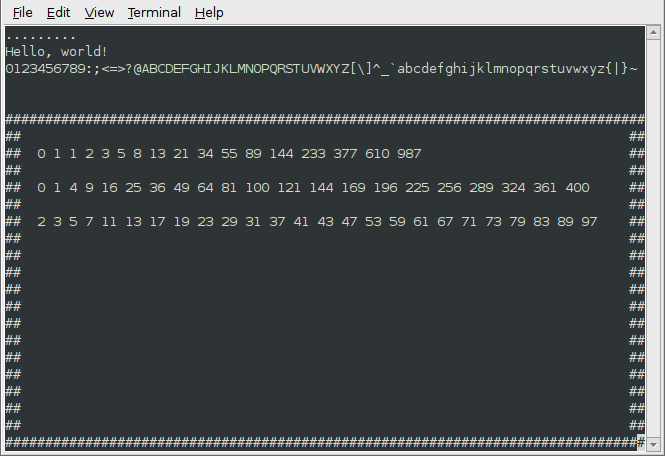 I included an interactive debugger as well.
I included an interactive debugger as well. 
